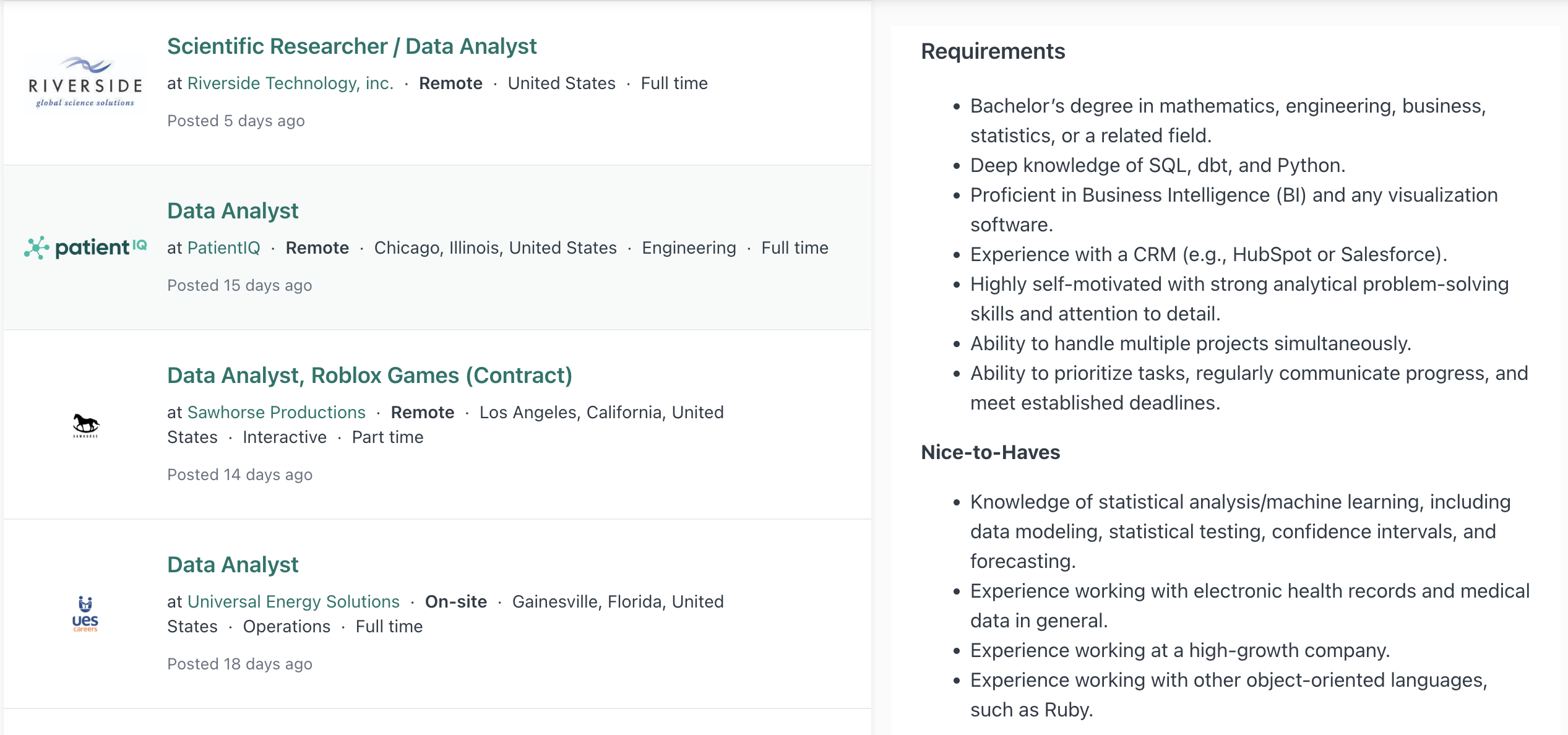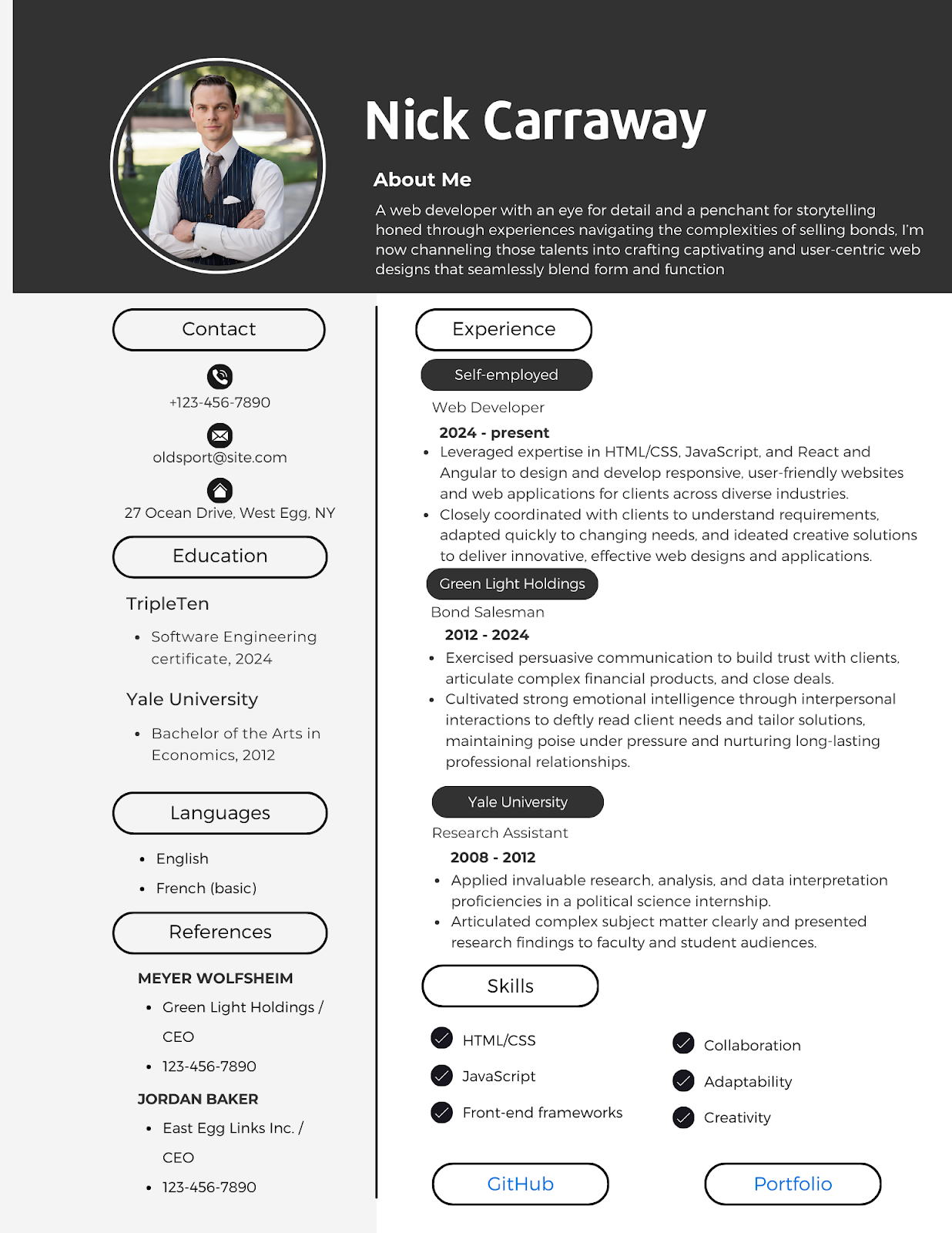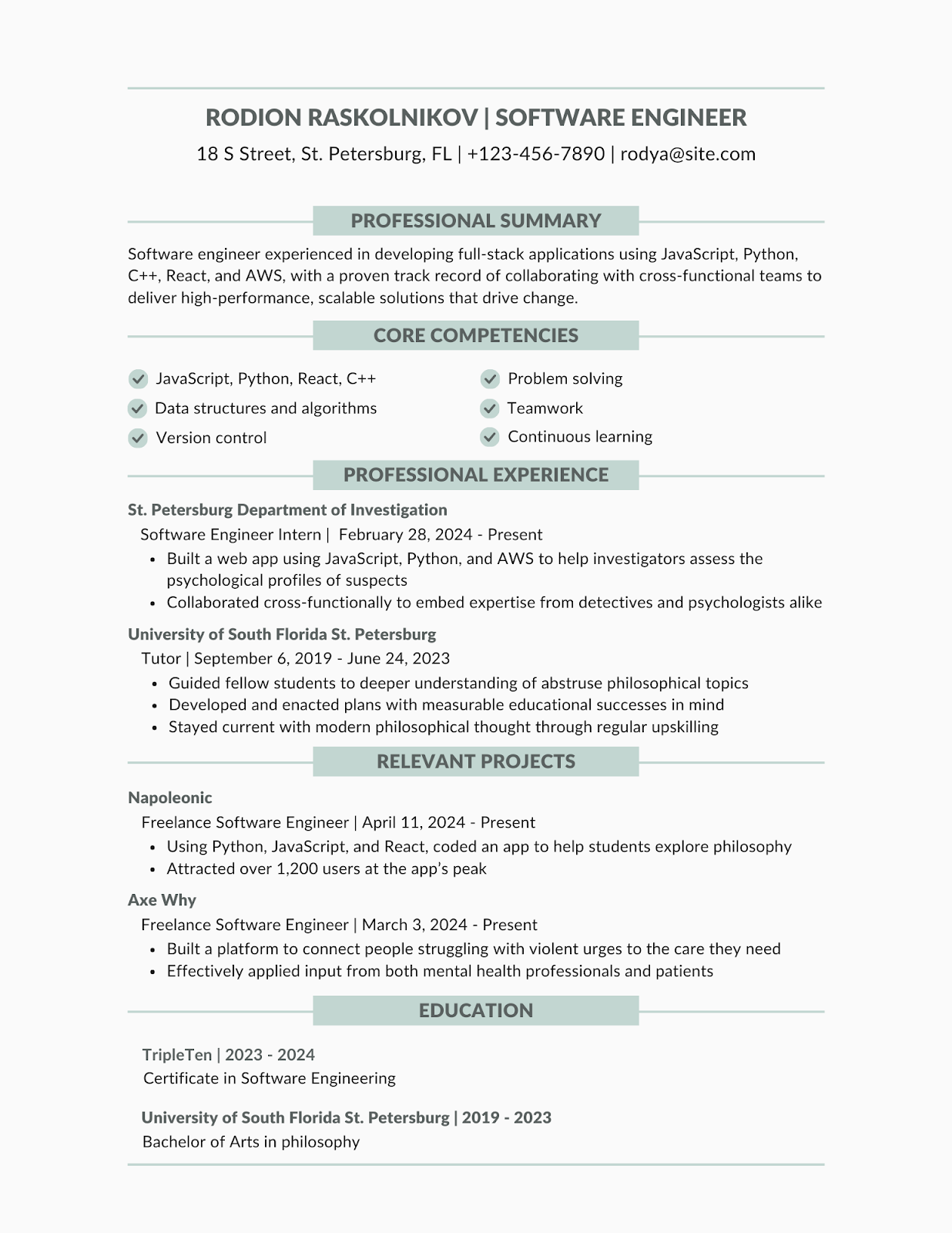If you’re a data analyst, web developer, or software engineer looking for a new career, you might have noticed a trend across those job descriptions you’ve read: they all seem to want certain tech skills. And you have most of them.
But what if you don’t have all of them?
The good news is these technical skills – as well as many of the soft skills typical for these roles – are learnable or transferable. Your unique blend of training/school, expertise, and past experiences can be enough to round out your skills on a resume and help convince a hiring manager that you’re the right fit for the job.
Keep reading to discover the most in-demand tech skills employers want for roles in data analysis, web development, and software engineering. Plus, we’ll include some tips for how to showcase them front-and-center in the skills section on your resume (or anywhere they’re good to highlight, really).
This is what employers are looking for
Before we jump into the best skills you should have for various tech jobs, let’s see what tech jobs and skills employers are actually interested in. We recently surveyed over 1,000 employers who told us the roles they’re looking to hire for the rest of 2024, and three titles clearly came out on top.
.png)
A solid 44% of respondents told us they want to hire a data analyst more than all other roles common in the tech industry. But only two responses (not two percentage points!) made the data analyst role top priority, as 43% of employers also noted they need web developers. Software engineers were next up with 41% of respondents ready to hire for this position throughout the rest of this year.
But what about the skills these three positions should have? That’s where the data gets more interesting.

Almost 70% of surveyed employers said that hard skills (i.e. technical skills) were the most important quality for candidates to have. Soft skills — capabilities like project management, communication, and critical thinking — weren’t far behind at 65%, with employers saying these qualities were also crucial.
The skills that didn’t make it as far up the list? About 60% of employers wanted to see prior experience in a related role, while 50% of them want to see a solid portfolio. And only 24% of them care about an undergraduate or master’s degree. In fact, respondents who prioritized skills outnumbered those who prioritized degrees by a ratio of nearly 3 to 1.
What this means for you is that while your past jobs, examples of work, and education are all well and good, they aren’t as important to future employers as that specific tech skill you have related to, say, programming languages.
The skills you need for the top tech professions of 2024
Now that you know what roles employers are looking for this year, let’s dive into the specific technology skills and soft skills employers preferably want you to have for each.
Top skills for data analysts
Data analysts play a crucial role in pulling actionable insights from complex datasets to help inform business decisions. Some technical skills examples you’ll need are below, rounded out with some soft skills that will come in handy in future roles.
Hard skills:
- SQL: Data analysts rely on SQL (Structured Query Language) to manage, retrieve, and manipulate data from relational databases. Arguably the most important tech skill needed for data analysts, SQL helps analysts communicate with these databases and write complex queries to pull the exact information that’s needed.
- Python: Analysts should be proficient in programming languages like Python or R to accomplish tasks such as data cleaning and statistical analysis.
- Data visualization: Data analysts use tools like Tableau, Power BI, or Matplotlib in Python to create visually appealing charts and graphs that communicate insights effectively to stakeholders.
Soft skills:
- Communication: Data analysts need strong communication skills to translate data-related findings into clear insights and takeaways for non-technical stakeholders.
- Problem solving: Analyzing data often involves identifying patterns, trends, and anomalies, requiring sharp problem-solving skills to determine what data is most important to a company’s success.
- Attention to detail: Accuracy is paramount in data analysis, which means attention to detail is critical for ensuring the quality and reliability of final outputs.
What skills are employers looking for?
Employers want data analysts who have these types of skills:

How can you show your data analyst skills on a resume?
Highlight your expertise in both hard computer skills and soft skills in a related section on your resume, and make sure to provide concrete examples of projects where you've applied these skills to solve real-world business problems. Here’s a resume template to get you started:

Top skills for web developers
Web developers are responsible for building and maintaining websites and web applications, making their role pivotal for any company keeping up-to-date with digital trends. As such, these are the primary soft and technical skills employers are looking for in web developers:
Hard skills:
- HTML/CSS: These fundamental markup and styling languages are the building blocks of web development, used to structure and design web pages.
- JavaScript: A versatile programming language, JavaScript is essential for creating interactive and dynamic web experiences. You can learn JavaScript a variety of ways, including online courses, certifications, and bootcamps.
- Front-end frameworks: Proficiency in popular frontend frameworks like React, Angular, or Vue.js is highly valued, as these frameworks streamline the development process and enhance user experience.
Soft skills:
- Collaboration: Web development projects often involve collaboration with designers, other developers, and stakeholders like marketing departments, making teamwork and communication essential.
- Adaptability: The website, social media, and digital app landscape evolves rapidly, so developers must be adaptable and open to learning new technologies and methodologies as they become more widely used and standardized.
- Creativity: Web developers get to use creativity probably more than most other tech jobs. Designing intuitive user interfaces and solving complex technical challenges while adhering to best practices and design principles is key to succeeding in this role.
What skills are employers looking for?
Employers want web developers who have these types of skills:

How can you show your web developer skills on a resume?
Showcase your proficiency in HTML/CSS, JavaScript, and relevant front-end frameworks in your resume's technical skills section. Make sure to provide links to your portfolio or GitHub to demonstrate your abilities where you contributed to successful web development projects.

Top skills for software engineers
Software engineers are digital architects who make computer software and solutions that power almost everything in our modern world, making this a highly desired role among employers and candidates alike. Alongside the following soft skills, software engineers should include these technical skills for resume creation:
Hard skills:
- Programming languages: Not unlike data analysts and web developers, proficiency in programming languages such as Java, Python, C++, or JavaScript is foundational for software engineering roles, enabling engineers to design, develop, and maintain scalable software solutions.
- Data structures and algorithms: A deep understanding of data structures and algorithms is essential for optimizing code efficiency and solving complex computational problems.
- Version control: Familiarity with version control systems like Git is crucial for collaborative software development and success. This knowledge helps engineers track changes, manage codebases, and collaborate seamlessly to avoid unnecessary hiccups in development.
Soft skills:
- Problem solving: Software engineers must possess strong problem-solving skills to analyze complex issues, debug code, and create efficient solutions that meet business requirements.
- Teamwork: Collaborating with cross-functional teams, including product managers, designers, and fellow developers, requires effective communication, empathy, and collaboration skills.
- Continuous learning: Again, similar to web developers, the technology landscape evolves rapidly, so software engineers must be willing to learn continuously and work on self-improvement and career development to stay on top of emerging trends and best practices.
What skills are employers looking for?
Employers want software engineers who have these types of skills:

How can you show your software engineer skills on a resume?
List technical skills related to programming languages, data structures, and version control systems in the main skills section of your resume, and include examples of projects where you've shown proficiency in relevant soft skills, as well. Here’s a resume example:

To wrap up, landing a job in tech requires a combination of hard technical expertise and soft skills that will help you succeed at your new career. By honing your skills and effectively showcasing them on your resume, you'll be well-positioned for the job you’re looking for in fields like data analysis, web development, and software engineering.
See if a bootcamp is your way to gain these skills! Take our self-assessment quiz.



.jpg)





.webp)



%20(1).avif)



